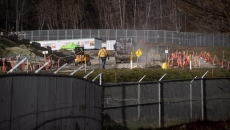Taxpayer dollars are heavily distorting Canada's financial marketplace in favour of fossil fuel pipelines, new research suggests.
The International Institute for Sustainable Development says spending by provincial and federal governments combined with the value of loan guarantees and other fiscal instruments intended to help get the lines built is worth a total of $23 billion.
The great majority of that money isn't in direct subsidies to the now-defunct Keystone XL or ongoing Trans Mountain and Coastal GasLink projects, said report author Vanessa Corkal. But backstopping loans and reducing other kinds of risks for pipelines encourages companies to make choices they wouldn't otherwise make, she said.
"Direct spending is only one form of the ways government can steer the market."
The institute spent two years combing through public documents on government support for the three pipelines.
That includes $11.3 billion in loans from the federal government to finance the purchase of the Trans Mountain Pipeline and $6 billion Alberta offered to guarantee loans for Keystone XL, which was ultimately cancelled by U.S. President Joe Biden. It also includes a $500 million loan for the construction of Coastal GasLink.
But the institute also says governments are involved in other ways to minimize risk for industry.
Trans Mountain Corporation, the government-owned entity that purchased the Trans Mountain project, has spent $34 million covering its operating losses and pension expenses. Ottawa has also promised to stand behind a $2 billion "emergency fund" promised by Alberta in case the project encounters "unforeseen circumstances."
Any of its environmental liabilities would be covered by another $2-billion federal pledge. Another $46 million will help with its financing costs.
"Understanding the money that is currently tied up in pipelines is crucial so that Canadians can understand what's at stake and what is the opportunity we have to redirect some of this funding to industries that will help us move forward," Corkal said. "There's a limit to how much money can go toward stimulus."
Corkal said her calculations only include present incentives and don't make projections of future costs. She added that lack of government transparency means her estimates are incomplete — especially for the now publicly owned Trans Mountain line.
"What did the government value the pipeline at?" Corkal asked.
"Did they overpay? What are the projections for what it will make in the future? What are the terms of the loan? We filed many requests, but the results that we got did not actually contain the details that we needed."
Many of the advantages that government support gives are hard to quantify but still valuable, she said. For example, Canada has promised to protect any future owner of Trans Mountain from any other government trying to block its construction or delay granting permits.
"The $23 billion that we identify is really just what we are able to quantify," Corkal said.
Federal and Alberta government spokespeople were not immediately available to comment on the study.
Corkal acknowledges that the resources offered to the Keystone project are no longer on the table now the project is dead. But she said they're included in the report to show how heavily government is still willing to back the industry.
While the report says Alberta invested $1.5 billion in Keystone XL, government figures say the province's losses after the project died were $1.3 billion.
Corkal added that once governments are involved in a project, it's hard for them to back out.
"Now that governments have assumed these risks, they're going to double down on them."






